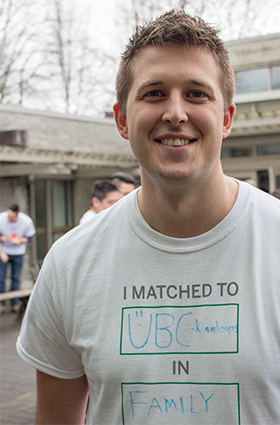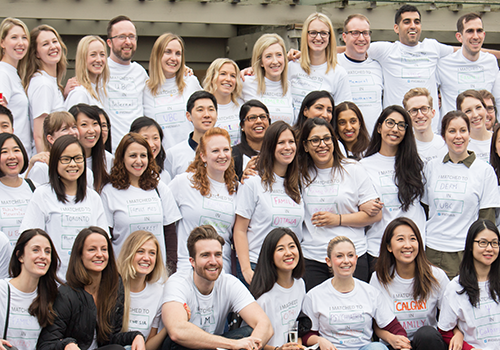
UBC MD student Patrick McCaffery will join UBC’s two-year Family Medicine Residency Program this summer.
Fourth-year UBC medical student Patrick McCaffery inspects a hand-drawn map of Canada, displaying fingerprints dotted across the country.
“I’ll be going here,” says McCaffery, pointing to Kamloops. “I’m really excited to be joining UBC’s Family Medicine Residency Program, and to be matched to the training site in Kamloops, my hometown, is really exciting. I grew up there, and my family, as well as my partner’s family, all live in the community so it’s great to be returning as a resident.”
On March 2, McCaffery joined hundreds of other UBC medical students from the class of 2016, who came out to ‘make their mark’ and celebrate the results from the first round of the Canadian Resident Matching Service (CaRMS), which matches MD students with postgraduate training programs nationwide.
96 per cent of UBC MD students matched to postgraduate training programs in the first round. Nearly half will be joining Family Medicine residency programs — both here in B.C. and across the nation.
David Snadden, Executive Associate Dean, Education, says he is very encouraged by this year’s strong results.
“Today’s match results are a testament to the caliber of our medical students, who have worked incredibly hard over the course of their time at UBC. The strong match results are also a reflection of the high level of commitment among our faculty and staff, who are dedicated to preparing our learners for professional service delivery,” says Dr. Snadden, who has helped lead the expansion of UBC’s medical school over the course of the past decade.
UBC’s undergraduate medical program, distributed across four unique training sites, accepts 288 students each year — up 123 per cent since 2003.
But UBC medical students, like McCaffery, were not the only ones celebrating the match results on Wednesday.

On March 2, UBC fourth-year MD students gathered to celebrate the results from the first round of the Canadian Resident Matching Service (CaRMS), which matches MD graduates with postgraduate training programs nationwide.
For the fourth year in a row, UBC’s postgraduate medical education programs accepted a record number of entry-level residents, with 99 per cent of the 345 positions filled in the first round.
“I’m very excited by the growing number of doctors embarking on training across our province,” says Roger Wong, Associate Dean, Postgraduate Medical Education. “By using a distributed model, we’re continuing to expand opportunities for residents to train and build strong ties with communities across B.C., including on Vancouver Island, in the North, the Interior and the Lower Mainland.”
This year, as in the past, Family Medicine accounted for the largest number (nearly half) of the residency positions at UBC, with all 169 entry-level Family Medicine residency positions across the province filled in the first round.
“We are delighted with the 100 per cent match results,” says Willa Henry, Director of UBC’s Family Medicine Residency Program — now the largest Family Medicine residency program in Canada. “The growth of our program over the past decade has greatly increased the number of training opportunities across B.C., including in rural and remote communities. With this expansion, we’ve also seen an increase in service capacity, which has helped to meet the primary care needs of British Columbians.”
This summer, a new Family Medicine residency site will launch in the South Okanagan (based in Penticton), becoming the 18th Family Medicine training site in B.C. In 2015, UBC opened a new Family Medicine residency site in Kootenay-Boundary, as well as a new Pediatrics residency training site on Vancouver Island, broadening pediatric medicine training outside of Vancouver.
A second round of the CaRMS match for the remaining unfilled positions will be held in April.
For more photo highlights, click here.
To become a doctor, students complete 4 years of undergraduate medical education, followed by postgraduate training which ranges from 2 years for family medicine, to 7 years for some specialties.
CaRMS Match Day 2016 from UBC MedIT on Vimeo.